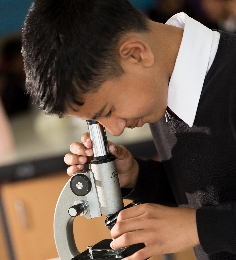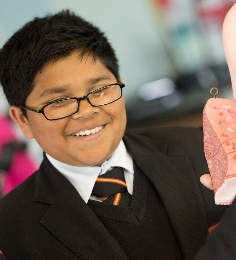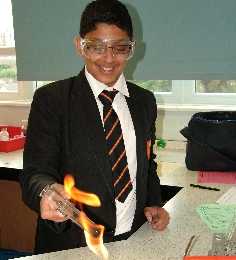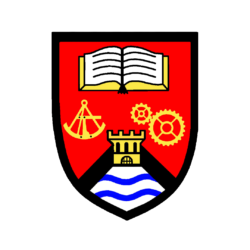Faculty of:
Science
Head of Faculty:
Mr A. Hussain
Members of staff:

- Ms S. Islam (2nd I/C of faculty)
- Ms R. Gill (HoKS5 and Biology coordinator)
- Ms L. Morhtassi (KS5 Chemistry coordinator)
- Mr P. Yu (KS5 Physics coordinator)
- Mr K. Choudhury
- Mr M. Karim
- Mr S. Hussain
- Mr H. Ahmed
- Mr A. Rakib
- Mr A. Hassan
- Mr P. Mazzaschi (technician)
About the department:
The science department prides itself on its work ethic; it is made up of teachers from a wide range of scientific disciplines. We are a team of dedicated practitioners who strive for excellence and are committed to giving our students the best. Over the past few years we have achieved very good exam results and have obtained outstanding judgements from HMI (2012) and Ofsted (2014).
Key stage 3 Curriculum:
The KS3 curriculum is covered in years 7&8. The programme of study we follow is broad and balanced, equipping our students with the essential knowledge and skills needed for a good start in their GCSEs.
Topics covered at KS3:
| Year 7 | Year 8 |
| WS: Working Scientifically | B2.1 Health and lifestyle |
| B1.1 Cells | B2.2 Ecosystem processes |
| B1.2 Structure and function of body systems | B2.3 Adaptation and inheritance |
| B1.3 Reproduction | C2.1 The periodic table |
| P1.1 Forces | C2.2 Separation techniques |
| P1.2 Sound | C2.3 Metals and acids |
| P1.3 Light | C2.4 The earth |
| C1.1 Particles and their behaviour | P2.1 Electricity and magnetism |
| C1.2 Elements, atoms and their compounds | P2.4 Energy |
| C1.3 Reactions | P2.3 Motion and pressure |
| C1.4 Acids and alkalis |
Key stage 4 Curriculum:
The KS4 curriculum is covered in years 9-11; it builds upon the work covered at KS3.

We follow the OCR gateway B syllabus. Courses offered are listed below with links to the exam board:
GCSE courses offered:
Topics covered at KS4:
| Combined Science | Separate Sciences |
| J250: B1 Cell level systems B2 Scaling up B3 Organism level systems B4 Community level systems B5 Genes, inheritance and selection B6 Global challenges C1 Particles C2 Elements, compounds and mixtures C3 Chemical reactions C4 Predicting and identifying reactions and products C: Monitoring and controlling chemical reactions C6 Global challenges P1 Matter P2 Forces P3 Electricity and magnetism P4 Waves and radioactivity P5 Energy P6 Global challenges | J247: B1 Cell level systems B2 Scaling up B3 Organism level systems B4 Community level systems B5 Genes, inheritance and selection B6 Global challenges J248: C1 Particles C2 Elements, compounds and mixtures C3 Chemical reactions C4 Predicting and identifying reactions and products C5 Monitoring and controlling chemical reactions C6 Global challenges J249: P1 Matter P2 Forces P3 Electricity P4 Magnetism and magnetic fields P5 Waves in matter P6 Radioactivity P7 Energy P8 Global challenges |
Key stage 5 Curriculum:
The KS5 curriculum is covered in years 12-13; it extends upon the work covered at KS4.
To ensure continuity, again we follow the OCR syllabi for the Sciences. The courses offered are listed below with links to the exam board:
AS/ A2 courses offered:
| Biology H420 | Chemistry H432 | Physics H556 |
| Development of practical skills in: – Biology – Basic components of living systems – Biological molecules – Enzymes – Plasma membranes – Cell divisions – Exchange surfaces and breathing – Transport in animals – Transport in plants – Classification an evolution – Biodiversity – Communicable diseases – Neuronal communication – Hormonal communication – Homeostasis – Plant responses – Energy for biological processes – Respiration – Genetics of living systems – Patterns of inheritance and variation – Manipulating genomes – Cloning and biotechnology – Ecosystems – Populations and sustainability | Development of practical skills in: – Chemistry Atoms, ions and compounds – Amount of substance – Acid and redox – Electrons and bonding – Shapes of molecules and intermolecular forces – Periodicity – Reactivity trends – Enthalpy – Reaction rates and equilibrium – Basic concepts of organic chemistry – Alkanes – Alkenes – Alcohols – Haloalkanes – Organic synthesis – Spectroscopy – Rates of reactions – Equilibrium – Acids, bases, and pH – Buffers and neutralisation – Enthalpy and entropy – Redox and electrode potentials – Transition elements – Aromatic – Chemistry – Carbonyls and carboxylic acids – Amines, amino acids, and proteins – Organic synthesis – Chromatography and spectroscop | Development of practical skills in: – Physics – Foundation of physics – Motion – Forces in action – Work, energy, power – Materials – Laws of motion and “p” – Current and charge – Energy, power, resistance – Electrical circuits – Waves 1 – Waves 2 – Quantum Physics – Thermal physics – Ideal gases – Circular motion – Oscillations – Gravitational fields – Stars – Cosmology – Capacitance – Electric fields – Magnetic fields – Particle physics – Radioactivity – Nuclear physics – Medical imaging – Unifying concepts |
Extra-Curricular:
In order to further support our students, intervention classes are run during the school week and during the holidays. Furthermore, we take our students on a number of trips to enhance their learning experience.
Electronic learning:
Some useful links for science are given below:
KS3
- http://www.bbc.co.uk/bitesize/ks3/science/
- http://lgfl.skoool.co.uk/keystage3.aspx?id=80
- http://www.educationquizzes.com/ks3/science/
KS4
- http://www.bbc.co.uk/schools/gcsebitesize/science/ocr_gateway/
- http://www.bbc.co.uk/schools/gcsebitesize/science/add_ocr_gateway/
- http://www.bbc.co.uk/schools/gcsebitesize/science/triple_ocr_gateway/
KS5

Biology
- http://www.s-cool.co.uk/a-level/biology
- http://www.biology-innovation.co.uk/
- http://home.comcast.net/~clupold96/
Chemistry
- http://www.s-cool.co.uk/a-level/chemistry
- http://a-levelchemistry.co.uk/
- http://www.chemguide.co.uk/links.html
Physics

